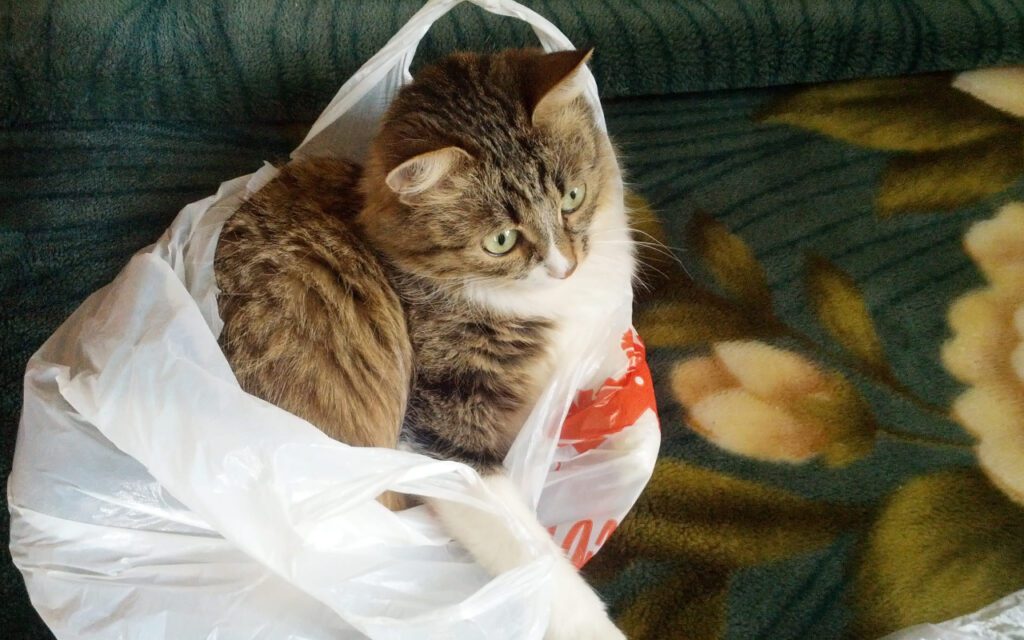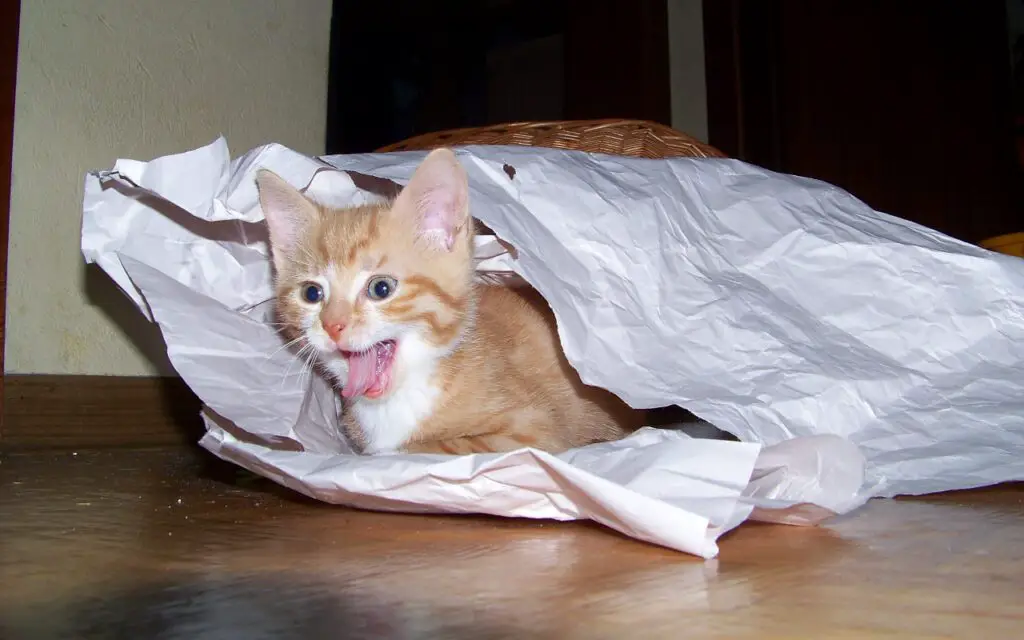Cats often find themselves licking plastic bags and other non-food items due to a variety of reasons.
Some cats may be attracted to the texture or smell of these objects, while others may just feel curious about what’s inside them.
While it is unlikely that any harm would come from a cat licking a plastic bag, as long as it is free of toxins and chemicals, it is important to note that this behavior should not be encouraged.
- Key Takeaway
- What Is Pica in Cats
- Why Cats Lick Plastic Bags?
- Is It Safe For My Cat To Lick Plastic Bags?
- How Do I Get My Cat To Stop Eating Plastic?
- How Do You Treat Pica In Cats?
- Identify and Remove the Targeted Items
- Provide Suitable Alternatives
- Use Deterrents
- Dietary Changes
- Medication and Professional Help
- Environmental Enrichment and Behavior Modification
- Do Cats Grow Out of Pica?
- FAQs
- Q: Is it harmful for cats to lick plastic bags?
- Q: What is pica?
- Q: Can cats chew on plastic bags?
- Q: Why do cats like plastic bags?
- Q: How can I prevent my cat from chewing or licking plastic bags?
- Q: Are biodegradable plastic bags safe for cats to chew or lick?
- Q: Can plastic bags be dangerous for cats?
- Q: What can I do if my cat loves to lick plastic bags?
- Q: Should I be concerned if my cat chews on plastic bags occasionally?
- In Conclusion
Key Takeaway
- Pica in cats is a behavioral condition where cats persistently chew and ingest non-food objects, such as plastics, fabrics, rubber, plants, and soil, which can be potentially dangerous to their health.
- Cats may lick plastic bags due to various reasons such as the presence of food traces, attraction to the texture or the crinkling sound of the bag, the taste of specific chemicals used in the bag’s manufacture, or as a symptom of a compulsive disorder known as pica.
- While licking plastic bags may not be immediately harmful, it can escalate to chewing and swallowing, which poses a risk of choking and intestinal blockage, making it unsafe for cats.
What Is Pica in Cats
Pica in cats refers to the behavior of eating non-edible items or materials with no nutritional value.
This could include things like plastic, fabric, rubber, plants, or soil. It’s a condition that is often seen in certain breeds like Siamese but can occur in any cat.
Pica could be a learned behavior that cats do out of boredom, stress, or to satisfy a primal urge.
However, it’s important to note that it can be dangerous for the cat as chewing on inappropriate items such as electrical cords could lead to harm.
Why Cats Lick Plastic Bags?

Cats may lick plastic bags due to pica, a texture-based eating disorder, attraction to certain chemicals in plastic that mimic pheromones, and the presence of lubricating chemicals known as “slip agents”.
Some feline experts believe that the temperature of the plastic may attract cats, while others think that cats may be drawn to the smell of leftover food traces on plastic bags.
Additionally, some cats may simply enjoy the crinkly noise made by plastic bags as it resembles the sound of prey.
Is It Safe For My Cat To Lick Plastic Bags?

Licking plastic bags isn’t inherently harmful to cats, but the concern arises when licking progresses to chewing and swallowing, as this could lead to choking or intestinal blockage.
Some plastics also contain chemicals that may mimic pheromones or other attractants, and there’s a possibility that ingesting these might not be safe for cats.
Furthermore, if there are traces of leftover food in plastic bags, this could lead to the consumption of harmful bacteria.
Therefore, while occasional licking might not be harmful, it’s best to prevent your cat from developing a habit of it to avoid potential risks.
How Do I Get My Cat To Stop Eating Plastic?
- Remove the Temptation: Keep plastic bags and other plastic items out of your cat’s reach. Use storage containers that your cat can’t open.
- Provide Alternatives: Give your cat plenty of toys to play with so they’re less likely to be interested in plastic items. Some cats enjoy toys that crinkle like plastic bags.
- Use Deterrents: Apply a safe but unpleasant-tasting substance on plastic items that you can’t remove or hide. There are commercial products available that are designed to deter pets from chewing on certain things.
- Consult a Veterinarian: If your cat’s plastic-eating habit is severe, consult with a vet. They might recommend dietary changes or even refer you to an animal behaviorist.
- Enrichment Activities: Keep your cat mentally stimulated by providing various forms of entertainment such as puzzle feeders, window perches for bird watching, and interactive playtime.
- Positive Reinforcement: Reward your cat when they show interest in their toys and ignore the plastic. This can help reinforce good behaviors.
- Regular Feeding Schedule: Ensure your cat is fed at regular intervals to reduce their tendency to seek out non-food items.
- Avoid Punishment: Never punish your cat for eating plastic, as this might create fear and anxiety, which can actually exacerbate the problem.
How Do You Treat Pica In Cats?
Here is how to treat pica in cats:
Identify and Remove the Targeted Items
The first step in treating pica in cats involves identifying what non-food items your cat is attracted to and removing them from their environment. This could be anything from plastic bags to clothing or plants. By eliminating these items, you can prevent your cat from consuming them and potentially causing harm.
Provide Suitable Alternatives
Give your cat other items to chew on that are safe and healthy. This could include cat-safe toys or chew treats. These alternatives can help satisfy your cat’s urge to chew without the risk of harm.
Use Deterrents
If it’s not possible to remove all targeted items, consider using “no-chew sprays” or other deterrents. These can make the items less appealing to your cat and discourage them from chewing or eating them.
Dietary Changes
Some cats may benefit from changes to their diet. “Free-feeding” or providing frequent small meals can sometimes help manage pica symptoms. Additionally, food puzzles can provide mental stimulation and reduce the urge to chew on non-food items.
Medication and Professional Help
In some cases, medication may be necessary to treat pica in cats. Antidepressants and anti-anxiety medications can sometimes help. Always consult with a vet before starting any new medication. If your cat’s pica is severe or causing significant issues, consider seeking the help of an animal behaviorist.
Environmental Enrichment and Behavior Modification
Addressing any underlying behavioral issues can also help treat pica. This could involve providing more environmental enrichment, such as new toys or activities, to keep your cat mentally stimulated. Behavior modification techniques, such as positive reinforcement when your cat avoids chewing on non-food items, can also be beneficial.
Do Cats Grow Out of Pica?
Some cats may outgrow pica as they get older, but this is not the case for all cats. Pica, the behavior of eating non-food items, can persist in some cats and become particularly resistant to change.
Commonly ingested items by cats with pica include wool, fabric, wood, plastic, paper, and plants.
The prognosis for cats displaying pica behavior is guarded, meaning that while some felines might grow out of the inappropriate behavior, others might require continuous treatment.
Therefore, if a cat is showing signs of pica, it’s important to seek medical intervention.
FAQs
Q: Is it harmful for cats to lick plastic bags?
A: Licking plastic bags is generally not harmful to cats. However, it is important to note that chewing and ingesting plastic can pose health risks. Ingesting large pieces of plastic can cause blockages in the digestive system, leading to potential surgery and other complications.
Q: What is pica?
A: Pica is a disorder characterized by the consumption of non-food items, such as plastic. Some cats may develop pica and develop a habit of chewing or licking plastic bags. If you suspect your cat has pica, it is best to consult with a veterinarian to determine the underlying cause and appropriate treatment.
Q: Can cats chew on plastic bags?
A: Cats can chew on plastic bags, but it is not recommended. Chewing on plastic can lead to ingestion, which poses a risk of blockages in the digestive system. It is important to prevent your cat from accessing plastic bags and provide them with safe alternatives for chewing and play.
Q: Why do cats like plastic bags?
A: Cats may be attracted to plastic bags for several reasons. The crinkly texture and sound of the bags can be intriguing and stimulating for cats. Additionally, the scent of the bags, especially if they contain food or animal fat, may be enticing to cats.
Q: How can I prevent my cat from chewing or licking plastic bags?
A: To prevent your cat from chewing or licking plastic bags, store them out of your cat’s reach. Instead, provide your cat with appropriate toys and objects to satisfy their need to chew and play. Ensure your cat’s environment is enriched with stimulating activities to divert their attention from the bags.
Q: Are biodegradable plastic bags safe for cats to chew or lick?
A: Biodegradable plastic bags may still pose a risk to cats if ingested. While these bags are designed to break down more easily, they can still cause blockages in the digestive system if consumed in large quantities. It is best to keep all types of plastic bags away from your cat.
Q: Can plastic bags be dangerous for cats?
A: Yes, plastic bags can be dangerous for cats if ingested. Ingesting larger pieces of plastic can lead to blockages in the digestive system, causing discomfort, pain, and potentially life-threatening complications. It is important to keep plastic bags out of your cat’s reach to prevent any health risks.
Q: What can I do if my cat loves to lick plastic bags?
A: If your cat has a habit of licking plastic bags, it is important to limit their access to the bags. Store them out of reach, preferably in a closed cabinet or drawer. Offer your cat alternative toys and objects for play and provide mental and physical stimulation to redirect their attention and energy.
Q: Should I be concerned if my cat chews on plastic bags occasionally?
A: While occasional chewing on plastic bags may not be a cause for immediate concern, it is still best to prevent your cat from accessing them altogether. It only takes one ingestion to potentially cause a serious blockage. Monitor your cat’s behavior and always prioritize their safety by keeping plastic bags out of their reach.
In Conclusion
Cats licking plastic bags is a common and harmless behavior.
While cats may be exploring the texture of the material, they may also get an interesting taste from chemicals that are found in some plastics, such as polypropylene.





Leave a Reply